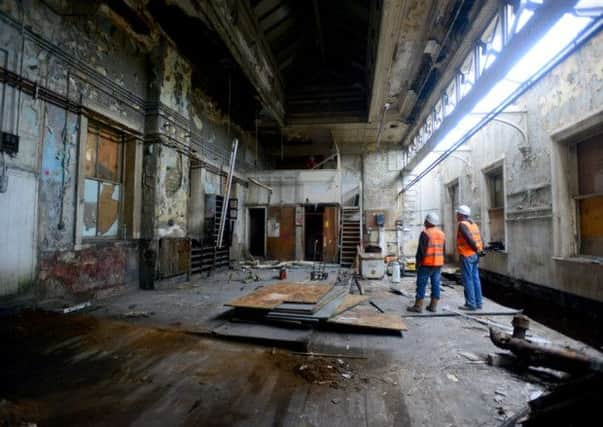Tony Lodge: Lessons of grand reopening of a Yorkshire railway station


THIRTY TWO long years stand between the last London-bound train leaving Wakefield Kirkgate and the new high- speed service starting in 2010. During this time, the 1854 Grade II Listed railway station was effectively abandoned by British Rail, allowed to become semi-derelict and at very real risk of demolition by the 2000s.
During the 1980s and 90s BR chose instead to concentrate on the rich pickings from Wakefield’s Westgate Station, with its lucrative InterCity services to London. Things became so bad that in 2008 Labour’s then Transport Secretary, Lord Adonis, visited and declared the station the “worst in Britain”.
Advertisement
Hide AdAdvertisement
Hide AdToday’s grand reopening follows a £5.6m three-year rebuild and restoration which was long overdue and reflects a wider underlying trend as regards the state of the railways in Britain and their future. There are grounds for real optimism. Kirkgate’s revival is a credit to the various local bodies which put up the money and the commitment of the railway companies who retained faith in the station’s potential. But what does the Kirkgate restoration really signify?
A credible and robust business case simply could not have been made for the Kirkgate work without the resumption of high speed long distance London-bound trains. Before they restarted there were only short-hop local services using the unwelcoming platforms; the station buildings were boarded up years ago.
The new Grand Central services started in May 2010 and the fastest now reach London in just over two hours 10 minutes. The former British Rail service which was ended in May 1978 took two hours 51 minutes.
These Grand Central long distance services, known as ‘open access’, have done two important things to invigorate the local rail market and thus help justify the Kirkgate restoration. They provide valuable competition and choice with Virgin trains which also operate to London but out of the neighbouring Wakefield Westgate station; this competition helps deliver lower fares and more satisfied passengers. They also deliver direct rail services to other local towns and cities such as Bradford and Halifax.
Advertisement
Hide AdAdvertisement
Hide AdConsequently, passenger satisfaction with the Grand Central services are the highest in Britain, at 94 per cent, according to Passenger Focus. They have also recorded the highest year on year growth in passenger traffic amongst all train companies, at 17 per cent between 2013-14. It can be argued that the emergence of some real rail competition, which still remains limited across the UK, has delivered tangible benefits in Wakefield, not just with more passenger choice and lower fares but now with improved facilities. Since the Kirkgate service started, Grand Central has seen a 200 per cent increase in ticket sales.
Yorkshire rail passengers are unique in that they are particularly benefiting from this development as two ‘open access’ rail operators, Grand Central and Hull Trains, connect the county with London and the North East, competing with the main line franchise holder, Virgin East Coast. Comparing so called on the day ‘walk up’ fares for travel between Wakefield and London shows that Virgin is almost twice as expensive as Grand Central at £96.80 as against £55.40.
Last month the Government approved plans to allow similar open access competitive high- speed services to connect Blackpool and the North West with London. Similarly, they will also compete with the Virgin franchise. These new Alliance Rail services will start in 2018 and use new high speed tilting trains. As with Kirkgate, the company intends to improve passenger facilities at Blackpool and other stations on the West Coast Main Line.
Since 1993 the rail network has witnessed an extraordinary boom in use. Passenger journeys have more than doubled to a level not seen since the 1920s. There are 4,000 more services a day on the network compared with 15 years ago and safety has never been better.
Advertisement
Hide AdAdvertisement
Hide AdLabour’s plans to pay civil servants to bid for the right to run rail services again would be hugely expensive and arguably illegal. How can it work? A government-owned rail company bidding for a government rail contract, with rail access approved by a government-appointed regulator and operating on infrastructure managed by the government?
Today’s grand reopening of Wakefield Kirkgate is perhaps an unlikely location to appreciate the real and tangible benefits of a more competitive and innovative railway. It would not have happened if the railways’ new innovators had not decided to take the risk.
This should not be lost on the Transport Minister and Harrogate MP, Andrew Jones, as he attends today’s opening ceremony. Indeed, this is a project which deserves national attention.
Tony Lodge is a Research Fellow at the Centre for Policy Studies and author of, ‘Rail’s Second Chance – putting competition back on track’ published by the CPS.